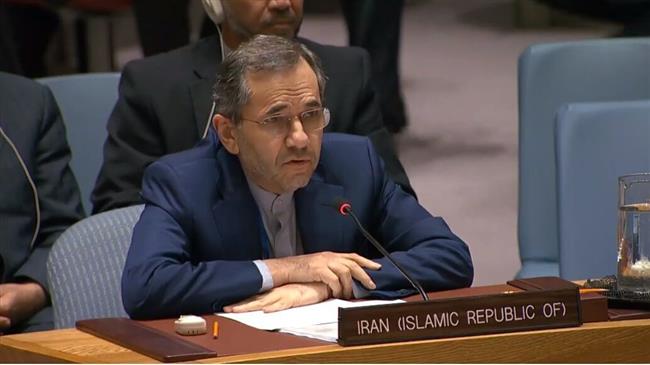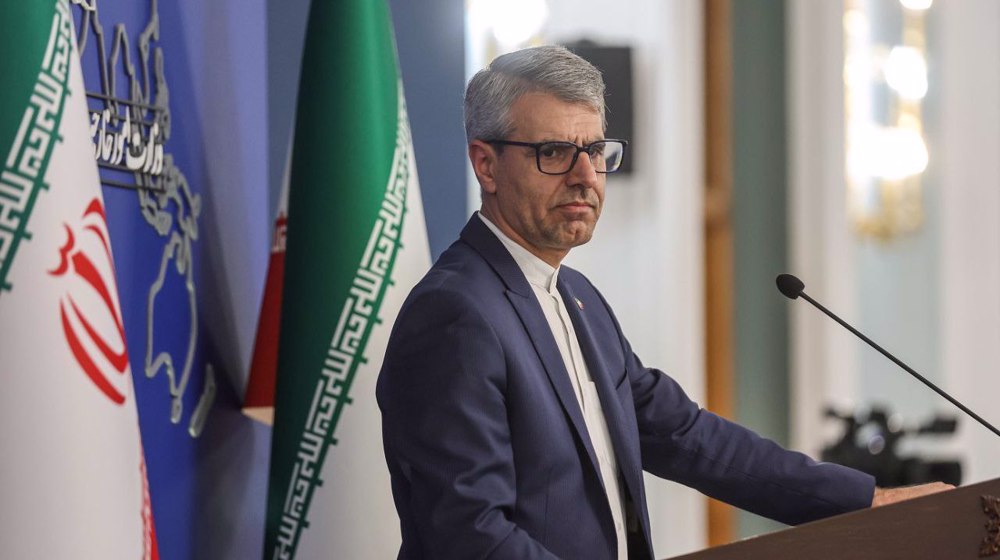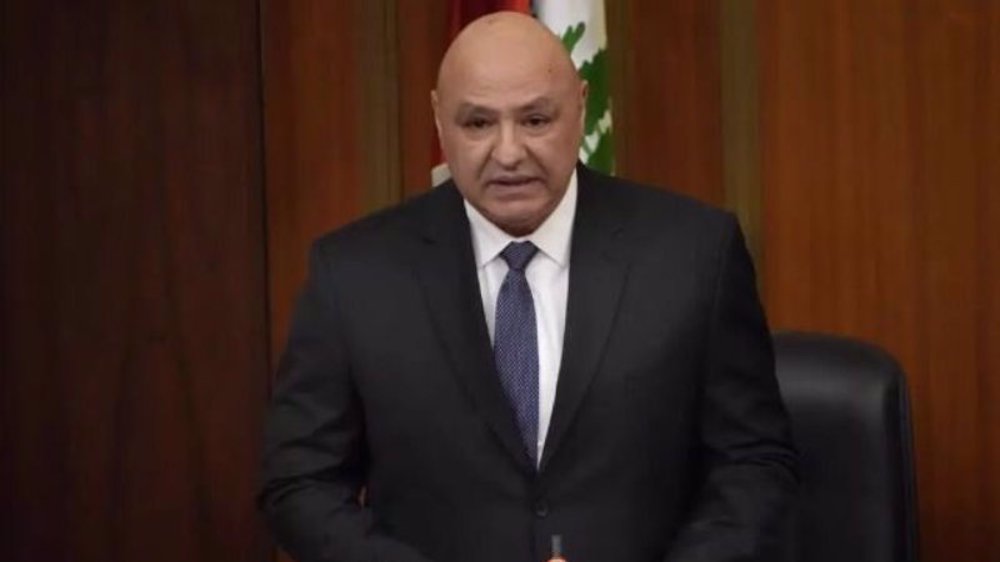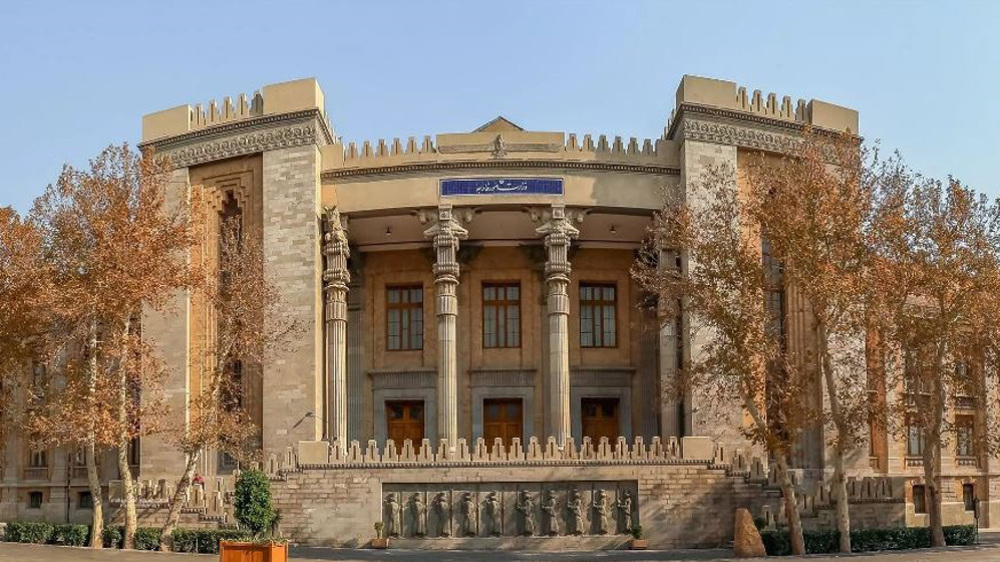US resorting to 'maximum deception' campaign against Iran: Envoy
Iran's ambassador to the UN has rejected "certain baseless accusations" repeated by the US against the Islamic Republic's space and ballistic missile activities, saying Washington is resorting to a “maximum deception” campaign in dealing with Tehran.
"This 'maximum deception' campaign is in line with and a living example of the so-called 'maximum pressure' policy of the United States against Iran," Majid Takht-e Ravanchi said in separate letters to the United Nations and the UN Security Council on Friday.
He added that Iran has repeatedly announced that none of its "ballistic missiles are designed to be capable of delivering nuclear weapons" and added that paragraph 3 of annex B to Resolution 2231 (which endorses a nuclear deal signed between Iran and major world powers) does not limit, in any way, Iran’s activities regarding the conventional ballistic missiles.
"Consequently, Iran’s related activities are not inconsistent with that paragraph. Rather, they fall outside of the purview or competence of the Security Council resolution and its annexes (S/2015/550)," he added.
The Iranian diplomat firmly rejected the desperate attempts by the United States for the arbitrary reinterpretation of paragraph 3 of annex B to Resolution 2231.
"There is no implicit or explicit reference in that paragraph either to the Missile Technology Control Regime itself or to its definitions and, thus, any reference thereto is totally misleading. Moreover, while the Missile Technology Control Regime criteria are not legally binding, even for its 35 members, any attempt to portray them as the universally agreed definition is definitively premature."
Read more:
- US pressure has failed, Trump should return to JCPOA: Zarif
- US claims about Iran role in Aramco raid 'maximum deceit'
- US must end sanctions, maximum pressure on Iran: China
The Iranian diplomat pointed to the US' "unlawful" withdrawal from the nuclear deal, officially known as the Joint Comprehensive Plan of Action (JCPOA), and its subsequent policies and practices in violation of Resolution 2231, and said Washington's "call for re-imposing the restrictions contained in Security Council Resolution 1929 (2010) -- which is a terminated and, in fact, dead resolution -- is ironic."
"In fact, when the United States, a permanent member of the Security Council, chooses to defy the Council’s resolutions repeatedly without consequence, it seriously undermines the fundamental credibility of the Council," Takht-e Ravanchi said.
He warned that the continuation of such US policies and practices would further erode the Security Council's credibility, which already faces a severe trust and confidence deficit due to such irresponsible policies of that country.
He once again reiterated that Iran has not conducted any activity inconsistent with paragraph 3 of annex B to Resolution 2231 (2015), saying, "It is determined to resolutely continue its activities related to ballistic missiles and space launch vehicles, both of which are its inherent rights under international law and are necessary for securing its security as well as socioeconomic interests, respectively."
The top Iranian diplomat emphasized that no amount of smear campaign, disinformation and deception against Tehran can change the realities about Washington's illegal practices and irresponsible policies, or distract attention away from its "destructive policies, malign behavior and destabilizing measures, in particular in the Middle East."
"Instead of such futile attempts and baseless allegations, the United States must stop exporting an unprecedented amount of sophisticated weaponry to the Middle East, which are used including for death and destruction in Yemen by the closest regional allies of the United States," he pointed out.
Leader of the Islamic Revolution Ayatollah Seyyed Ali Khamenei said on Tuesday that Iran will not engage in negotiations with the United States “at any level,” and that Washington's so-called "maximum pressure" campaign against the Iranian nation has failed to achieve its goals.
Ayatollah Khamenei added that entering talks with the US under the current circumstances would be tantamount to surrendering to Washington's undue pressure campaign, saying, "Negotiating would mean Washington imposing its demands on Tehran. It would also be a manifestation of the victory of America’s maximum pressure campaign.”
Scores killed as US, Turkish proxies clash in northern Syria
At least 5 dead as wildfires devour districts across Los Angeles
VIDEO | Press TV's news headlines
Houthi: Israel incapable of downing Yemen’s hypersonic missiles
Inquiry: UK soldiers executed Afghan boys 'younger than 16'
Palestinian dies due to medical negligence he faced in Israeli prisons
IRGC forces launch final stage of major drill in western Iran
Joseph Aoun voted Lebanon’s president, ending 2-year deadlock











 This makes it easy to access the Press TV website
This makes it easy to access the Press TV website